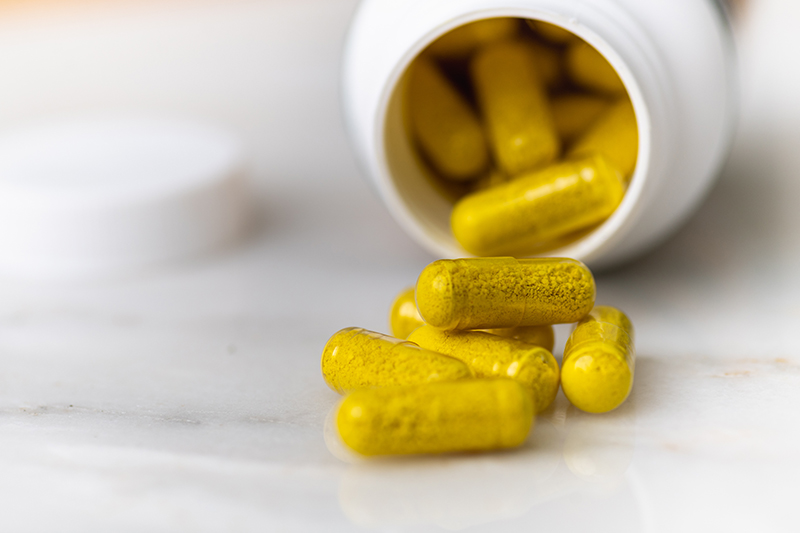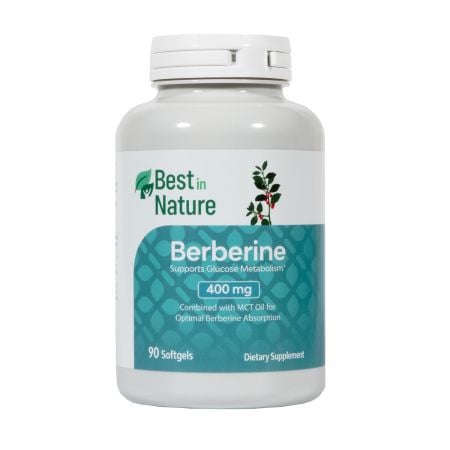
Reviewed and Updated: September 10th, 2024
Ozempic has been the talk of the town in weight loss and celebrity culture over the last year or two. Even with all of its hype and promise, its side effects have people wondering if there could be a natural alternative. Well, some people are calling berberine “nature’s Ozempic” on places like Tik Tok. Can they provide similar results? Is berberine safer just because it’s natural? Let’s take a closer look at what berberine is and what it does.
What is Berberine?

Berberine is a compound that’s been traditionally used in Chinese medicine to treat infections, diarrhea and other inflammatory conditions.
It’s found in some plants like European barberry, goldenseal, goldthread, Oregon grape, phellodendron, and tree turmeric.
Berberine’s taste is described as intensely bitter which can present challenges for people who are looking to get berberine’s potential benefits.
Can Berberine Help You Lose Weight?

So naturally, with the comparison people on social media keep making between berberine and Ozempic, you’re probably wondering if berberine has any weight loss benefits.
In 2022, a review of 18 studies found an association between berberine and weight loss particularly amongst those who took more than 1 gram for more than 8 weeks. However, the larger analysis found inconsistencies in results. (National Center for Complementary and Integrative Health)
At least one part of its weight management properties seems to come from berberine’s ability to promote AMPK activation (AMPK is an enzyme related to blood sugar and metabolism). Ozempic also acts on this enzyme which seems to be the source of the comparison between the two. Berberine promotes absorption of cholesterol and less accumulation of glucose which can assist in weight loss.
Other Benefits of Berberine
Berberine Can Lower Blood Sugar for Those with Diabetes

In small studies, those with type 2 diabetes experienced lower blood sugar when taking berberine. A 2020 randomized trial with 80 patients comparing berberine to metformin, found berberine to be as effective as the metformin.
Further, a review of 46 studies in 2021 also supported berberine’s ability to lower blood sugar but the effects dropped off when patients took it for longer than 12 weeks, patients were over 60 years old or the dosage was greater than 2 grams. The study showed the best results between 8 to 12 weeks in which BMI was decreased, fasting insulin release was lowered, and insulin resistance was improved.
Berberine May Promote Heart Health

There are several ways that berberine may promote better cardiovascular health.
First, studies have found berberine to lower blood lipid levels especially LDL cholesterol and triglycerides.
Additionally, studies have found early indications that berberine can lower blood pressure and protect against hardening of the arteries.
Like always, we emphasize that you shouldn’t stop taking medications you’re prescribed by trying to replace them with berberine. Your doctor can advise if it’s right for you.
Berberine’s Side effects
Berberine is generally well-tolerated. In those who experience side effects, the effects seem to mostly be digestive issues including:
- Loss of appetite
- Vomiting
- Diarrhea
- Constipation
- Gas
- Abdominal pain
Who Shouldn’t Take Berberine
Women of childbearing age, women who are breastfeeding, infants and newborns are advised to avoid berberine. According to an article by Dr. Leslie Eiland at Nebraska Medicine, Berberine can cross the placenta and may cause harm to the fetus; specifically, kernicterus, a type of brain damage caused by jaundice (high levels of bilirubin in the blood). It can cause the same harm to infants via breast milk as well.
Additionally, people on prescription medication, especially blood-sugar lowering medication should be cautious. Berberine may cause one’s blood pressure to drop too low.
What is Ozempic?
Ozempic is the name of a prescription medication that many people often generically use to refer to the class of GLP-1 (glucagon-like peptide-1 receptor) medications. It was developed as a diabetes treatment but over the last few years has gained popularity for its off-label usage for weight loss. Off-label prescription, is usage that the medication was not studied and approved for by the FDA.
Ozempic is injected once weekly and works by mimicking a hormone AMPK in the body that helps to regulate blood sugar levels. However, the FDA approved Wegovy, which contains higher amounts of semaglutide, for weight loss for patients with a body mass index (BMI) of 30 or above.
Possible Benefits
Data suggests that Ozempic might:
- Lower heart attack risk
- Lower stroke risk
- Lower blood pressure
Ozempic’s Possible Side effects (directly from Ozempic’s literature)`
Every drug has risks, so side effects aren’t unique to Ozempic but they are part of the decision-making process for individuals considering it. The drug maker cites the possibility of the side effects below. Follow this link to read their literature more detailed information:
- Inflammation of your pancreas (pancreatitis)
- Changes in vision
- Low blood sugar (hypoglycemia)
- kidney problems (kidney failure) In people who have kidney problems
- Serious allergic reactions
- Gallbladder problems
Comparing Berberine to Ozempic
Dr. Mark Miller PhD at Kaiviti Consulting says that “...berberine is not nature’s Ozempic, despite social media assertions” He elaborates that although they have overlapping outcomes on cardiovascular health, diabetes, lipoproteins, atherosclerosis and vascular health, they arrive at these outcomes through different mechanisms.
Of Ozempic, he says, “Ozempic is a GLP-1 agonist (activates the receptor) resulting in a decrease in appetite. Furthermore, in terms of signal transduction, Ozempic lowers mTOR and raises AMPK activity,” (lowering mTOR and raising AMPK activity helps reduce stored fat cells) then in comparison “But berberine has a much more diverse series of mechanisms of action affecting cellular decision making, and AMPK activation is a very small part of that suite of actions, which sets it apart from Ozempic”
In short, Dr. Miller cautions treating the two as the same and elaborates that they have some overlapping outcomes but they work differently. Naturally, one may conclude that the degree to which one experiences these benefits might be quite different between the two. (Nutra-Ingredients)
Bottom Line
Berberine has basically become a viral sensation on social media by being compared to a popular medication. There’s some overlap in benefits but experts say that they work very differently and should not be thought of as equals that will provide the same effects.
*These statements have not been evaluated by the Food and Drug Administration. Products are not intended to diagnose, treat, cure or prevent disease.








Validate your login
Sign In
Create New Account